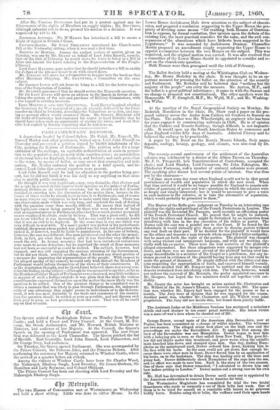PARLIAMEN TARY REFORM.
A deputation headed by Colonel Sykes, Mr. Caird, Mr. Roupell, Mr. Samuel Morley and other gentlemen, waited upon Lord John Russell on Thursday and presented a petition signed by 10,000 inhabitants of the City, prayinel. for Reform of Parliament. The petition asks for a large extension of the suffrage, an equitable redistribution of seats in propor- tion to the population and property of the constituencies ; an assimilation of electoral laws for England, Scotland, and Ireland ; and such protection to the voter, by means of ballot, as may arrest that corruption and inti- mation. Mr. Morley enforced the petition in a brief speech, and in- formed Lord John that several reporters were present.
Lord John Russell said he had no objection to the parties being pre- sent, but he did not think it was his duty to say anything on that occa- sion to gratify public curiosity.
He thought it was very important,—nay, very desirable, that electors and the people in general should express their opinions on the subject of Parlia- mentary Reform on all suitable occasions, but he should not feel himself justified in entering into the discussion of the matter then, because in the course of three weeks he should have to take it to Parliament, and of course he must reserve any statement he had to make until that time. There was one observation made which was very true, and rendered the task of dealing with the question more than usually difficult. He meant that instead of the legitimate course being pursued by those who were desirous of being sent as representatives to Parliament,there had been much greater pecuniary means employed to obtain seats by bribery. That was a great evil ; he did not know whether it was increasing, but no one could for a moment doubt that it was an evil to be deplored. At the same time it was one which was very difficult to deal with. If a man's pocket was picked of his pockethand- kerchief, the person whose pocket was picked was the loser, and the person who picked it, if detected, would be liable to punishment. In the case of bribery, however, the case was different. One man got the seat and the other the money. Both, in fact, got what they wanted, and it was therefore very difficult to reach the evil. In former measures that had been introduced endeavours were made to secure detection ; but he regretted the result of those measures had not been so successful as could be desired. The subject, however, had engaged, and was still engaging the anxious attention of the Government, but he did not think, strictly speaking, that it formed any direct portion of a measure for improving the representation of the people. With respect to the alleged apathy of the country he could only wish that all the Members of Parliament would inform themselves of the views of their constituents. If, as the deputation thought, and he (Lord John) believed, there was a very con- siderable feeling on the subject—although he was prepared to say that, as fir as the Membersof either House of Parliament were concerned, very little evidence in support of such a feeling existed—it was plain that the more the various constituencies expressed themselves upon the matter the more likely was the question to be settled. One of the greatest things to be considered was to obtain a measure that was likely to pass through Parliament, for, independ- ently of any advantage that- might accrue to individuals or to the Govern- ment, it was was most desirable to the trade and commerce of the country that the question should be settled as soon as possible, and not thrown over from year to year, as had previously been the case. That was all he could say on that occasion.


























 Previous page
Previous page